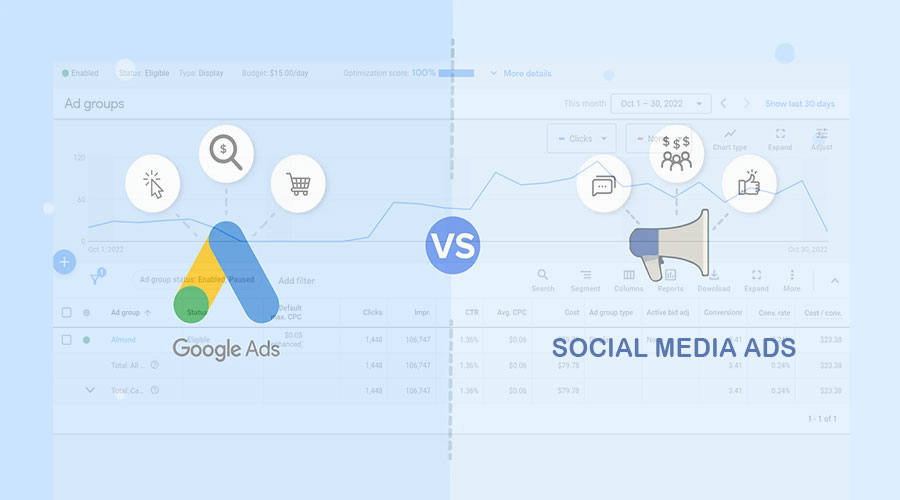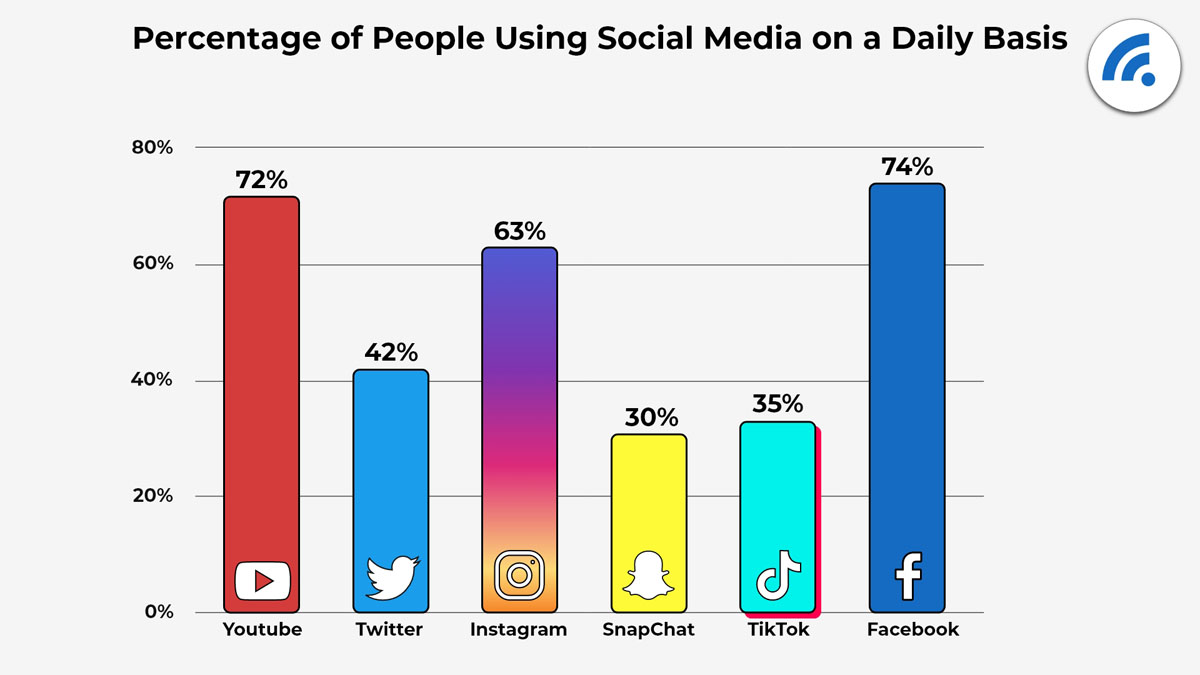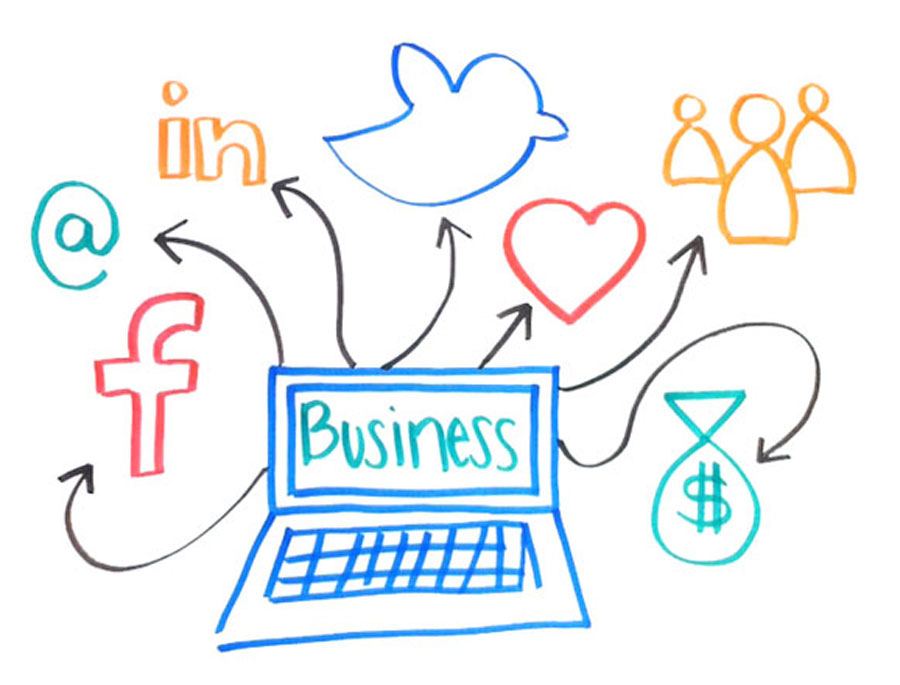Over 100,000 marketers in our community! Let's talk about your technology and marketing events/webinars in our community. Learn More
Social Media Ads vs. Google Ads
Originally published: December 13, 2021 04:00:59 PM, updated: November 19, 2022 12:00:00 AM

The world of advertising, like the products we use, is evolving. Although we see an upsurge in social media advertising, this does not imply that previous forms of digital advertising are dead. To begin with, there are numerous ad types to choose from, including Facebook ads, Instagram ads, search ads, display ads, video ads, and shopping ads. But let's focus on the differences between social media ads and Google Ads. Although they all have a similar principle, they target distinct audiences and serve various goals.
What is social media advertising?
Advertisements given to potential customers on social media platforms are known as social media advertising or social media targeting.
Social networks use user information to provide highly relevant adverts based on interactions inside a platform. When the target market matches the demographics of a social platform's users, social advertising can result in notable gains in conversions and sales at a cheaper cost of acquisition.
Recommended video: What is Social Media Advertising?
Pros of social media ads
Below are some of the benefits of social media advertising:
1. Increased Brand Awareness
It has been proven that promoting on social media enhances brand recognition. Companies can communicate with their potential customers on the familiar ground by regularly publishing on social media sites. This continual connection results in giving the impression of trustworthiness and a willingness to listen to what clients say. Customers familiar with your brand are more inclined to tell their friends and family about it, expanding your brand's reach. The brand should not continually hammer home its presence but should be subtle enough to make an impression.

Source: BroadbandSearch
2. Brand Loyalty Increased
Any business necessitates a loyal customer base to keep afloat. New customers are welcome gains, but without loyal consumers, conversion rates would be bleak to non-existent. Customers can express their opinions and feelings regarding services and items offered by advertising on social media. Client happiness rises tremendously as a result of listening to customer feedback, and brand loyalty increases as well. Customers will be happier with your turnaround time and will value your business more.
3. Lower Marketing Expenses
Social media marketing does not require a large sum of money compared to traditional marketing. Traditional marketing strategies fade out in favor of less resource-intensive methods as the corporate landscape evolves. As a result, using social media to sell products and services is a practical approach for businesses to cut costs. In terms of investment, social media do the majority of the work. The company needs a consistent theme, tone, and marketing plan to use the platforms. The expenditures are significantly lowered because more consumers may be addressed with the same monthly budget.
Recommended video: Social Media Marketing Tutorial - Identifying your audience
Cons of social media ads
1. Competitors who are negative and unprofessional
The growth of scammers, trolls, and hackers on social media is a significant problem. While many people utilize the platforms to remain in touch or promote their businesses honestly and respectfully, others try to exploit or harass others online.
This issue can manifest itself in the shape of derogatory remarks or slanderous communications, or it can take the form of a cyber-attack in which someone attempts to get into your account or steal vital information.
The culprit may be one of your competitors. To separate out from the mass, businesses should act professionally on social media and use strategy and clever advertising. However, it is not unheard of for a company to use negative techniques to smear their competitors' reputations.
2. Evaluation
While the return-on-investment in terms of online sales created by social media advertising is straightforward to calculate, there are some less obvious advantages. It isn't easy to quantify and evaluate the brand visibility and reputation that social media can provide. It's tough to say how social media influences in-store sales.

3. Platforms are limited
Even though social media may reach a large audience, marketing is confined to sites such as Facebook, Instagram, LinkedIn, and Twitter. Your marketing efforts will be harmed if any of these platforms go down. Similarly, you can only contact those who have accounts on those sites, which means you're missing out on potential customers who don't use them.
This is in contrast to Search Engine Optimization (SEO) or Search Engine Marketing (SEM), which promotes your business on a global scale while directing traffic to your own website.
Pros of Google Ads
1. Targeting capabilities
Marketers understand the value of high-quality leads. Your ad campaign should achieve your brand's goals at the end of the day. You can be confident of reaching your target audience because Google's algorithms are improving every day.
You have the option of bidding on specific long-tail keywords or shorter keywords. While the former allows you to target high-intent customers, the latter may allow you to obtain more traction with fewer leads.
 Do you have active campaigns on Google Ads and want us to audit them for evaluating their performance? If so, a well-executed audit will be handled to help you spot issues to fix, identify areas for improvement, and give you a clear overall picture of how well your Google Ads are performing. Contact us
Do you have active campaigns on Google Ads and want us to audit them for evaluating their performance? If so, a well-executed audit will be handled to help you spot issues to fix, identify areas for improvement, and give you a clear overall picture of how well your Google Ads are performing. Contact us
2. The ability to use the audience's intent to your advantage
Have you ever had the feeling that Google knows more about your preferences than your best friend? Google's intelligent algorithms can identify user intent and serve them exactly what they need.
Let's imagine you're running a campaign on social media or a website where the user's primary intent is to explore the web or engage in social media. Your ad must be engaging and persuasive enough to persuade users.
You can target users seeking a product that your company offers using Google Ads. This provides you an advantage over other advertising channels and allows you to generate more leads.

3. It's a versatile marketing tool
Anyone who uses Google Ads regularly will tell you that it's a versatile marketing tool. It's appropriate for all types and sizes of businesses. With this platform, you can literally turn internet traffic on and off. It also works with a variety of other marketing platforms and software programs.
Campaigns can simply be tailored to target various sorts of online consumers. You can, for example, target people based on their location, device type, and the Google-owned website they're visiting (e.g., Google search, Google Maps, YouTube).
4. Easy to measure ROI
What are the elements that are simple to measure? Google Ads makes it simple to track the effectiveness of every aspect of your marketing campaign. Clicks, impressions, click-through rate, conversion rate, cost per click, and cost per acquisition can all be measured. All of this makes calculating ROI a breeze. You may also evaluate the cost-effectiveness of different techniques. This allows you to plan for future advertising investments that will be effective.
5. Faster result than SEO
Businesses' visibility on Google is far more helpful than any other media to drive sales. Businesses have a fantastic opportunity to appear in front of people when they are searching for their product or service on a search engine.

However, if the opportunity is so ample, competition will be fierce. As a result, ranking organically on search engines is time-consuming and challenging. Organically, appropriate website optimization and gaining trust from authorized websites through backlinking can produce fantastic results, but it takes time.
Businesses may obtain results much faster with Google Ads. Clearly, there is competition in this area as well. The good news is that, in addition to the bid amount, the keyword's quality score, which includes ad relevancy, landing page experience, and projected CTR, decides the ad's position. As a result, proper Google Ads optimization combined with the required bid might result in a high return on investment.
Cons of Google Ads
1. You need a manpower
It's simple to set up a Google Ads campaign. However, it's a large tool that requires proper setup to be cost-effective.
To get all of the specifics of your campaign just perfect and avoid squandering your money, you may require the assistance of some specialists. Although there is a wealth of information available to assist you, there are few "quick wins" that can help you simplify or reduce your workload.
2. The cost per click in competitive industries is higher
You may want to launch your own Google Ads campaign because your competitors already utilize it. However, because of the severe competition, the cost per click is rising, rising, rising. If your keyword bid is too low, your advertising may be relegated to page 2 or 3 of the search results.
3. Your landing pages must be excellent
Because Google considers the quality of your landing pages, your website must be up to par in terms of relevance to the search query. You can't rely just on Google Ads to drive visitors; your landing pages must be high quality and relevant to your ads - SEO is essential. Your Quality Score will improve if you improve the landing pages on your website, which means you'll spend less for clicks.
Recommended reading: Which is a Best Practice for Optimizing a Landing Page for Google Ads

4. Features that aren't required
Not all functions will be beneficial, depending on your ad campaign goals. A campaign focused on desktop conversions and click-through, for example, will not require any data related to mobile traffic, calls, or texts. Instead, linking back to your main website would be more important to attract additional desktop engagement.
It's critical to figure out precisely what you need to avoid wasting money on services or analytics you won't utilize.
Which is the superior option?
The answer is contingent on your industry, target audience, and objectives. What are your goals? Are you attempting to produce leads, sales, or other revenue? Both platforms can then assist. If you want to raise brand exposure or build a social following, social media ads will help you get there. Google Search Ads effectively attract people at the bottom of the funnel. Finally, determining the best advertising plan necessitates study and patience. Ascertain that your digital advertising agency or social media marketing agency is aware of your company's objectives and audience requirements.
Got any questions? Ping me on Twitter.
Join over 100,000 SEO and Google Ads experts. We provide a community to help you engage and learn from industry experts and influencers. Join Now
Get Media Coverage for Your Business!
Get published on Google News, AP News, Benzinga, over 100+ NBC, FOX, ABC & CBS affiliate sites and more.



